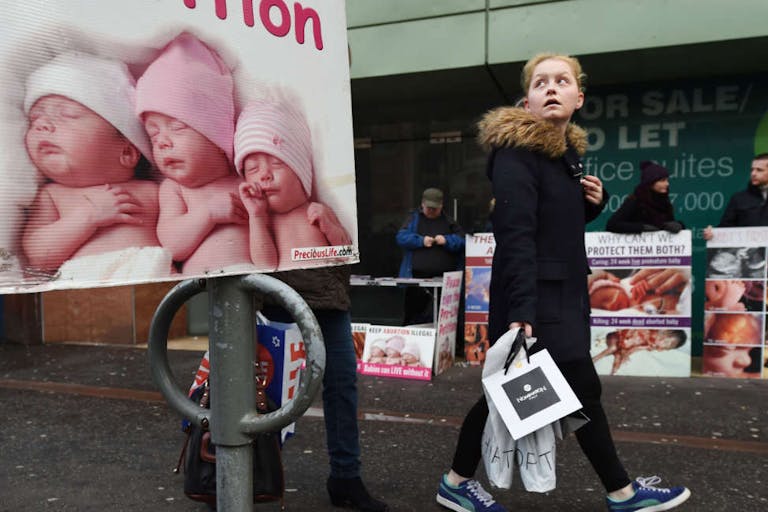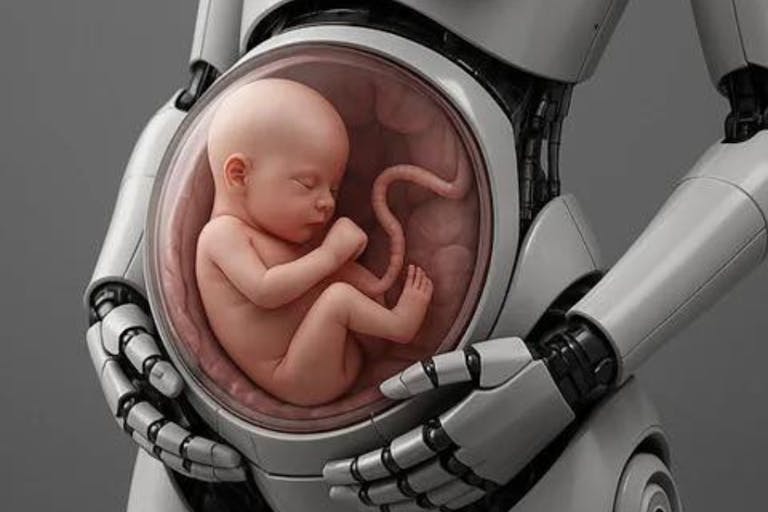
REPORT: Northern Ireland abortions up nearly 4% from previous year
Right to Life UK
·
International·By Nancy Flanders
Chinese scientists say they’ve created robots that can gestate humans
Scientists in China are allegedly creating “pregnancy robots” that will be capable of carrying human babies to term and then “giving birth.”
A tech company in China says it has developed a pregnancy robot to carry a human child from fertilization to “birth.”
The robot would cost 100,000 yuan ($13,900 USD) and is expected to be released next year.
Research shows that having a robot carry a human child could cause social and emotional damage to the child that will impact him or her for life.
Critics of the robot worry that it could lead to the erasure of women.
The pregnancy robot, created by Kaiwa Technology, is expected to release next year, with a selling price of 100,000 yuan ($13,900). Founder Zhang Qifeng said he hopes the robot will be able to replicate pregnancy from fertilization onward and claims his device is not an incubator, but a humanoid with an artificial uterus.
The artificial womb would be filled with artificial amniotic fluid, and the baby would receive nutrients through a hose — which sounds oddly reminiscent of a scene in the film, “The Matrix.”
“The artificial womb technology is already in a mature stage, and now it needs to be implanted in the robot’s abdomen so that a real person and the robot can interact to achieve pregnancy, allowing the fetus to grow inside,” said Dr. Zhang.
He likened the robot to the “biobag,” the artificial womb used in 2017 to allow a premature lamb to continue to grow. But that technology offered support to premature babies; the robot would replace a woman. He has not said how the sperm, egg, or embryo would enter the robot.
While he says he hopes it will help with the infertility crisis in China — where infertility has risen from 11.9% in 2007 to 18% in 2020 — using a robot to replace a mother crosses significant ethical boundaries.

The first major issue with a pregnancy robot is that it denies children the basic human right that is necessary in the development of healthy attachment: the mother-child bond that develops during pregnancy.
According to Science Direct:
The first 1000 days after conception are considered critical for healthy development and well-being throughout life.
An emotional connection from mother to child originates in pregnancy and that experiencing positive feelings towards the fetus promotes positive maternal-infant bonding after birth and social-emotional capacities of the child.
Additional research shows:
During pregnancy, an intense bond develops between mother and child. This bond is crucial, for both the emotional and physical well-being of the child.
The forming of this bond between the mother and child involves interactions at both the physiological and psychological levels. The physiologic interplay between mother and child via hormones and signals created and transferred through the placenta have been detailed in obstetric textbooks.
In other words, pregnancy builds a bond that continues after birth, and affects the child’s social and emotional health, as well as their ability to bond with other people throughout life.
This is why surrogacy is so problematic.
Research shows that taking babies from their birth mother — whether she is biologically related to them or not — causes immense trauma, and can permanently alter a child’s adult brain function later in life.
This is the case even with adoption, which exists to heal the wound that is created when biological parents are unable to care for a child. Surrogacy, however, deliberately creates a child with the intention of separating that child from his or her birth mother immediately after delivery.
But the robot takes it a step further, and completely erases the maternal-fetal bond that is the first step in building emotionally healthy individuals who are able to form attachments with other humans and develop compassion, empathy, and love for others.
Beyond the devastating effects surrogacy (and robot pregnancy) can have on children — and society — critics of the robot are worried that it will lead to the erasure of women.
Researchers from The Children’s Hospital of Philadelphia, where artificial wombs were being developed, wrote in 2022:
A concern is that it could lead to the devaluation or even pathologizing of pregnancy, and may diminish women’s experience of deriving meaning, empowerment, and self–fulfillment from this unique aspect of female biology.
Others are concerned that — as toxic feminism erroneously taught women that they don’t need men — the robot is the next step towards men believing they don’t need women.
Article continues below
Dear Reader,
Have you ever wanted to share the miracle of human development with little ones? Live Action is proud to present the "Baby Olivia" board book, which presents the content of Live Action's "Baby Olivia" fetal development video in a fun, new format. It's perfect for helping little minds understand the complex and beautiful process of human development in the womb.
Receive our brand new Baby Olivia board book when you give a one-time gift of $30 or more (or begin a new monthly gift of $15 or more).
Beyond helping an infertile couple have a child, the robot would remove even a human surrogate completely from the lives of children, bought and built by two (or more) men.
Children’s mothers will be nameless and faceless, creating a long-term social-emotional crisis.
If men don’t need women and women don’t need men, then why would a child need a father or a mother?
Even abortion supporters question the ethics of pregnancy robots — because the technology might expose the humanity of preborn children with a window into the womb and would essentially eradicate the bodily autonomy argument so often asserted.
Vardit Ravitsky, a bioethicist from Harvard Medical School and CEO of the Hastings Center, told the MIT Technology Review, “When we say that a woman has the right to terminate, do we mean the right to physically separate from the fetus? Or do we mean the right not to become a biological mother?”
If a preborn child developing inside a fake uterus inside a robot were to develop an unexpected health condition, as sometimes happens during development, would the intended parents be allowed to end that baby’s life?
What if the child were healthy, but the mother no longer wanted to be a mother due to a split from the father or the loss of her job? Would she be able to unplug the hose between the robot and the child?
Political philosopher Matt Deacon doesn’t think so. “With her interests intact, I see no reason why the genetic mother should be empowered with life and death authority. Authority over her body, yes. But assuming it’s healthy, not over the [child’s] life.”
Unfortunately, he’s wrong.
Based on the evolution of surrogacy contracts, which frequently include demands forcing the surrogate to undergo an abortion if the intended parents desire it, the right to life would not suddenly be extended to preborn children based on who — or what — is carrying the child.
The 2023 film “The Pod Generation” appeared to be a far-fetched dystopian nightmare, but apparently, it’s not quite so far-fetched.

The religious issues think tank Theos surveyed 2,292 people as part of its “Motherhood vs The Machine” podcast and found that while the majority of people (52%) oppose “growing a foetus entirely outside of a woman’s body,” Gen Z was the group that most supported it.
Only 32% of that generation said they oppose it, and 42% said they would support it.
Current laws prohibiting embryo experimentation at 14 days will hopefully stop the pregnancy robot in its tracks.
But if this unethical research is allowed to continue, many real preborn human beings are likely to lose their lives in the process.
Follow Live Action News on Facebook and Instagram for more pro-life news.
Live Action News is pro-life news and commentary from a pro-life perspective.
Contact editor@liveaction.org for questions, corrections, or if you are seeking permission to reprint any Live Action News content.
Guest Articles: To submit a guest article to Live Action News, email editor@liveaction.org with an attached Word document of 800-1000 words. Please also attach any photos relevant to your submission if applicable. If your submission is accepted for publication, you will be notified within three weeks. Guest articles are not compensated (see our Open License Agreement). Thank you for your interest in Live Action News!

Right to Life UK
·
International
Angeline Tan
·
International
Cassy Cooke
·
International
Angeline Tan
·
International
Bridget Sielicki
·
International
Cassy Cooke
·
Activism
Nancy Flanders
·
Opinion
Nancy Flanders
·
Investigative
Nancy Flanders
·
Analysis
Nancy Flanders
·
Politics
Nancy Flanders
·